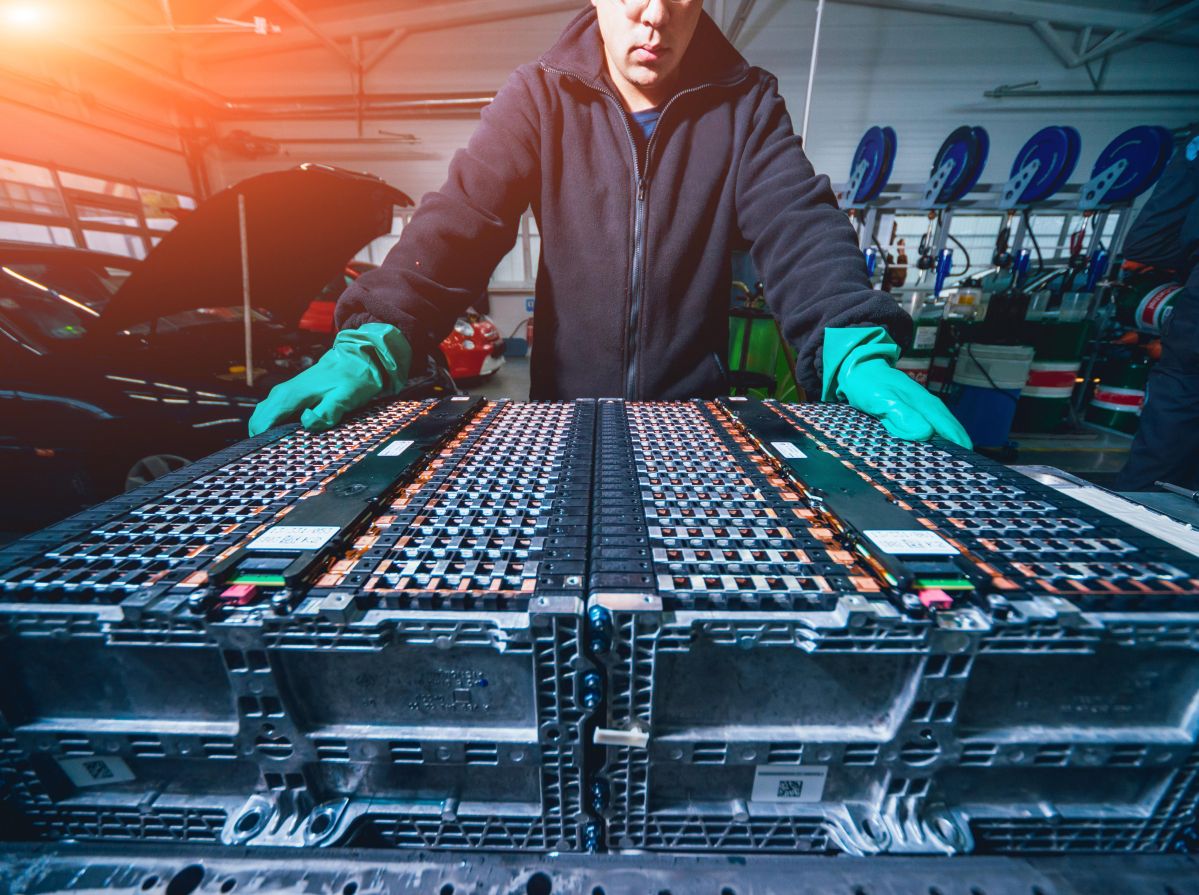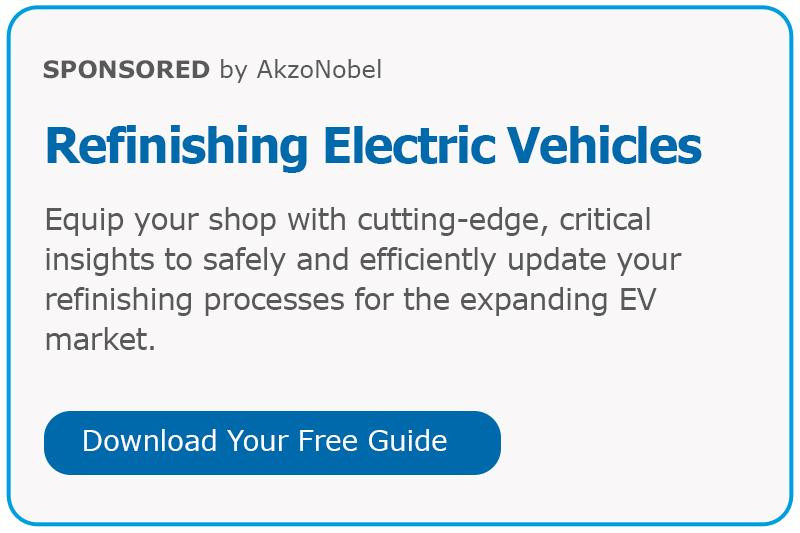Kelly Logan, director of collision repair programs at EV maker Rivian, and Kris Burton, owner of Rosslyn Auto Body and a board member with the Society of Collision Repair Specialists (SCRS), stopped by Autobody News' The Collision Vision podcast, hosted by Cole Strandberg, to share their insights on how body shops can take full advantage of the opportunities EV repair creates.
The Importance of Training and Safety
Logan said Rivian has a network of certified collision centers, but recently launched a new program to bring on third-party, independent service providers to work on the electric delivery vans it is building for Amazon.
Burton said his shop, which is located in Alexandria, VA, near Washington, D.C., started working on its Tesla certification in 2014. It now has that, as well as its Rivian certification.
"I think you've got to come into [repairing EVs] open minded, facility wise, tooling wise and then tech wise," Burton said. "You really need to make sure your techs are on board."
Logan, who has worked for two other EV startups before Rivian, including Tesla, said EV makers are looking for collision repair shops that are "open to growing with us, looking at training requirements and tooling requirements." He said Rivian tries to ensure shops are only buying special tools they absolutely need to repair their vehicles.
Strandberg asked Logan about the safety considerations involved in EV repair.
Logan said EV-specific training is critical to make sure technicians have the necessary skills and the information to be able to work on them safely. For instance, high-voltage gloves need to be checked regularly for pinholes, because an electrical short can jump through.
Rivian offers hands-on, instructor-led training for technicians who will be working on the vehicles, and online training for everyone who works in a repair shop in any role. "If there's a vehicle that has a battery pack out or has the front end tore apart and there's high voltage lines exposed, it's really good just to have everybody in the building on the same page as far as safety," Logan said.
Compared to ICE vehicles, EVs have much fewer moving parts, Logan said, but their high-voltage battery packs contain many modules, each holding thousands of individual battery cells. Repairers will never be asked by an OEM to fix a battery pack; if there's an issue with it, it will be replaced. But OEMs do have different instructions for when and how to remove the pack to complete other procedures.
"In the future, as EVs become more mainstream, maybe you'll have battery repair centers," Logan said. "But today that's going to be handled by the manufacturer. The shops will be just removing and replacing the pack or removing it and reinstalling it for a repair."
Logan said Rivian has a support team for its certified collision network, that looks at batteries in damaged vehicles on a case-by-case basis, to determine if dents or scratches on the case are allowable, or if the pack needs to be replaced. Sometimes that can be done by photos; other times, a technician from Rivian needs to physically inspect it or do pressure checks to make sure there is no internal damage.
"The nice thing about the Rivians is they were designed for off roading," Logan said. "We have a lot of underbody shields. The great thing is we don't see damage [to the battery packs] that often. But again, it happens. And as you get more and more vehicles on the road, the frequency will go up."
Strandberg asked Burton about how he made the decision to begin pursuing Tesla certification in 2014.
"It was an opportunity for us to be on the forefront, and especially in our region, here in the D.C. area," Burton said. "There's a lot of EVs on the road. It was really an opportunity for us to to help our business grow."
Burton said new tooling is not just an upfront cost, it's an ongoing one as well. For instance, certain welders have a specific lifespan. Training also requires an ongoing investment, including travel expenses to attend in-person classes, as vehicles continue to evolve.
"There is going to be constant change here [in required tooling] because the construction of vehicles are so drastically different than they used to be," Logan added. "And we can't fix keep fixing vehicles the way we always have."
How the Rise of EVs Will Shape the Future of Collision Repair
Logan said he does not see ICE vehicles becoming extinct, at least not in his lifetime. It will be up to shops on an individual basis to decide which certifications make the most sense to pursue, but the need to specialize could also drive opportunities.
"When you really get good at repairing one vehicle or a particular brand of vehicle, your whole shop gets comfortable. Your technicians get comfortable with how these vehicles are put together and how the repair procedures are laid out, and how how you write an accurate estimate. It really does help your overall business," Logan said.
Burton said his shop mostly only fixes vehicles for which it has certifications now. "It's five, six brands of cars that we repair," he said. "And we've got it down pretty well to how to move forward with those."
He also said he has five apprentices in his shop now, all between 18 and 20 years old, and if the shop had more space, it could probably bring in more.
"I think the the narrative that kids don't want to do [collision repair] is incorrect," he said. "I think a lot of kids do want to do this, but they want to be in a place where they're supported and where they're free to learn and where they can make mistakes and improve and grow."
Key Takeaways
Logan said shops should research OEMs' certification requirements to determine which ones make sense to pursue. Some won't fit a shop's particular business model.
"It's looking at where do you want to take your business in the future, and looking at do certifications make sense?" Logan said. "There's programs out there that are not as strenuous, and that's OK. And then there's programs like...Rivian. We have a lot of things to it. There's standards, there's tooling, there's a lot of investment. There's training commitments.
"So you can look at maybe dipping your toes into the water with with other programs, if it makes sense for your business," Logan said. "Or you can just jump right in, like [Burton] has done in the past, and get involved with it."
"I don't think every shop is for certifications," Burton added. "I think you really need to pick. I don't think every certification, every OEM even fits our model. I don't think you can be everything to anybody anymore."
Logan said Rivian has an online application for shops interested in becoming certified to work on their vehicles. As Rivian's vehicle population has grown -- doubling in the past two years -- so too has interest in being able to fix them. The EV maker carefully considers which shops to work with, based on where their customers are located.
"We want to make sure that the shops in our programs are successful," Logan said. "And so overloading the network with too many shops in markets can actually backfire where nobody's getting a return on their investment.
"Sometimes we get shops that are frustrated; they really are excited. They want to be on the network," Logan added. "We just want to make sure that they understand if you spend all this money and got brought on to the program, and you didn't see any vehicles, then you'd be upset."
Return on investment is key, Strandberg said, as there is a cost to getting certified that takes both time and money.
"Lastly, specialization," Strandberg said. "That's something both Kelly and Chris spent a ton of time on. If you want to make sure a certification offers you a good ROI, especially one for EVs, consider specializing if the market's right. If your talent's right."











Abby Andrews